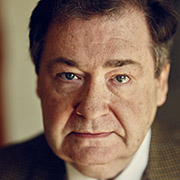The works by the Austrian composer Thomas Daniel Schlee display a distinctive human and personal style. You don’t need an instruction manual to appreciate them.
On the one hand it’s Austrian culture which has been decisive for the Viennese composer Thomas Daniel Schlee, and on the other hand French culture, as a pupil of Olivier Messiaen, so that you sense that breadth of interest which a monolingual terrain can’t offer. Ludwig Wittgenstein wrote: “The boundaries of your language are the boundaries of your world.” Schlee’s humanist outlook is shown in a statement such as this, which he made in February 2013 before the premiere of Rufe zu mir, a symphonic scena for organ and orchestra, in the Leipzig coram publico: “Art is also there to provide answers! The positive effect of art in history is cancelled out by the point of view that art is there in order to pose questions.”
If you study and listen to Schlee’s organ music with this background in mind, you soon notice that it is music for and not simply on this special instrument, this “sublime machine” – both in technical performance terms as well as in spiritual terms. The organ is not a neutral instrument: Schlee’s organ music is a great, emphatic “yes” to the spirituality inseparably associated with the organ sound.
Thomas Daniel Schlee’s personality and his music, mainly written in nocturnal working sessions or in phases of seclusion, captivate in their nobility. Yet this nobility is not restricted to external appearances. Schlee’s scores, which unmistakably display his uniting, distinctive personal style in their texture with all its multidimentionality, contrast with the smoothed out, seemingly streamlined interchangeability of other scores; irrespective of whether they were written in the Far or Middle East, in Europe or America, these seem arbitrary in so many respects, with their often graphically exquisite work with a short musical half-life. A music which communicates with people, which invites the listener, but never curries favour. The stupendous technical skill is incorporated so naturally that it never appears superficial. However, we quickly notice the level it is at when analytically examining its details and their transfer into greater contexts.
What might initally sound like friendly platitudes can easily be tried out in performance or the experiment of listening for oneself: you sense the enrichment. You perhaps don’t retain any “melody”, but you take away an impression, the reverberation of a comprehensible musical form, which you recall at a higher level, which cannot leave you cold because out of such a rich interior, it answers an immense fantasy and was formed, formulated by someone who has something to say.
You don’t need an instruction manual to be able to approach these works. For Schlee, composing stands within a multi-faceted professional portfolio as composer and artistic director. When writing, the question of whether it is new doesn’t play any role for him; things which are done just to be up with the latest trends prove to be untrue over the course of time: “I just write for my own enjoyment!”
If, by analogy, what Friedrich Nietzsche expressed is true, that our writing tools partly determine our thoughts, then we know that Thomas Daniel Schlee will never acquire any music notation software! He won’t want to lose track of the overview of all the hand-written pages of score and the preceding pages, of the sketches. The laborious but fulfilling business of writing out in ink, its gradual creation, develops the musical shaping, brings it to the best possible visible manifestation at the moment of writing. The fair copy based on a preliminary stage is never simply a copying out, it is almost always a clarifying and a refining. Schlee’s accompanying comments on the work, the metier and the cultural situation show a very particular point of view, one in which he is prepared to passionately defend its many facets; other comments point to great experience and suffering. In his compositional output, spirituality is a defining dimension, so that we can frequently recognize a “spiritual dominance” in works of different genres, and as well as this, many of the suggestive titles indicate this.
Michael Töpel
(from: [t]akte 2/2015)



